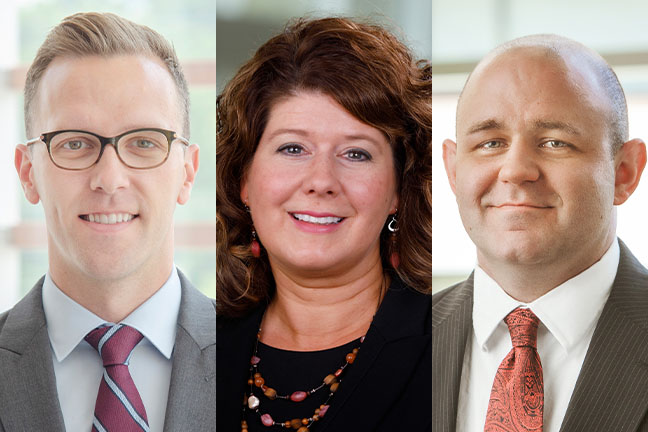The UNMC Department of Internal Medicine highlights two of its post-acute care clinics that opened in 2021. The stories appeared in the Internal Medicine Department’s 2022 Biennial Report, which was published earlier this year.
HOSPITAL MEDICINE
Clinic serves discharged hospital patients
Being discharged from a hospital stay or an emergency room visit can be a busy and overwhelming time for many patients. There are prescriptions to fill, orders to follow and follow-up appointments to schedule, in addition to trying to rest and recover. Especially for patients without a primary care provider, the chances of something falling through the cracks — and the potential for re-admittance to the hospital — is a real concern.
To help provide a resource and a one-point contact for these patients, the UNMC Division of Hospital Medicine has begun a Post Acute Care Clinic at Nebraska Medicine.
Nicholas Weiland, DO, assistant professor and medical director of the clinic, said the reasons for starting the clinic are straightforward: Reduce preventable admissions/re-admissions to the hospital, increase early safe discharges from the hospital and increase bed availability in the hospital.
“This clinic not only fills a void in patient care after discharge, but we think it’s the tip of the iceberg as far as rethinking the continuum of care when a patient is discharged, whether that be to their home, to a rehabilitation facility, to skilled nursing or to another location,” Dr. Weiland said.
Currently, the clinic has capacity to see about 15 patients remotely each day, seven days per week. The clinic is physician-run; its staff also includes a dedicated nurse and non-medical staff to help with virtual appointment set-ups.
Having a dedicated clinic available for an appointment within 24 hours of discharge from the hospital or emergency room — with a hospitalist — can make a critical difference in ensuring the patient won’t need to return to the hospital, said Tabatha Matthias, DO, assistant professor and associate chief of the division of hospital medicine.
Ultimately, she said, the clinic is another step in helping to deliver care in the most appropriate place for the optimal health of patients.
GENERAL INTERNAL MEDICINE
Clinic focuses on long-haul symptoms of COVID-19
In response to the growing number of individuals suffering from long-haul symptoms brought on by COVID-19 infection, Nebraska Medicine opened a post-acute COVID clinic in 2021 to help patients.
Since then, more than 200 people have been seen by a team of internists to try and help them deal with their symptoms. Patients then are referred to the appropriate specialist if they need specialized care.
“Our goal is to understand the impact of long-term symptoms of COVID-19 infections in people who have recovered from the initial illness, including how often symptoms occur and how severe they are,” said Andrew Vasey, MD, assistant professor and physician leader for the primary care clinical program.
Dr. Vasey said because of the wide variety of lingering symptoms, the decision about whether a patient needs to see a specialist is individualized. Common referrals have been to pulmonology, cardiology, behavioral medicine, physiatry and allergy, he said.
“Some people come in with one or two issues, while others come in with a dozen issues; we work with each to treat their individual symptoms,” he said.
A lot of the issues clinicians are seeing are related to autonomic nervous system dysfunction, Dr. Vasey said, and while some people experience symptoms for three months, others are a year out from their acute illness and still experiencing symptoms.
Those symptoms can include shortness of breath with activity and at rest, a fast heart rate, chest pressure and tightness, nausea, vomiting and diarrhea, brain fog, fatigue, anxiety and depression.
Dr. Vasey said the team works closely with the patients’ primary care provider to ensure continuity of care. “Everyone is seeing this to some degree, and the dialogue between providers is critical to helping these patients as they continue to recover,” he said.
